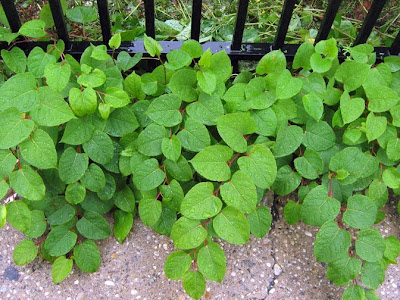 The Itoh peony (shown in the background of the photo) was originally developed in Japan in the 1940's. It's a cross between an herbaceous peony and a tree peony. It has large yellow flowers and long lasting blooms. And it was the talk of the town. People walking up and down the street loved these showy flowers.
The Itoh peony (shown in the background of the photo) was originally developed in Japan in the 1940's. It's a cross between an herbaceous peony and a tree peony. It has large yellow flowers and long lasting blooms. And it was the talk of the town. People walking up and down the street loved these showy flowers.Another interesting plant included in this garden is the pasque flower (Pulsatilla vulgaris). These plants have finely-dissected leaves and delicate seedheads (show in the photo) that make for an intriguing addition to a mixed perennial garden. Pasque refers to Easter (Passover), as these plants tend to flower around that time of year. A closely related species to the one that we planted is the state flower of South Dakota.

